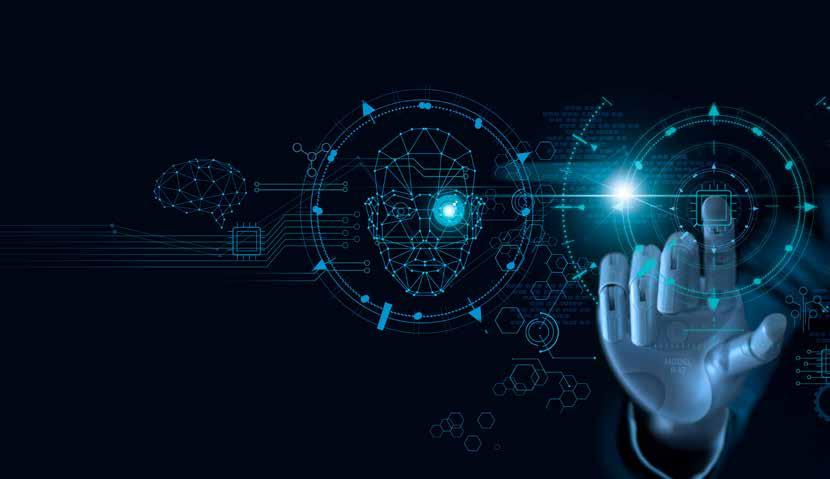
8 minute read
HOW AI IS CHANGING THE WORLD
ARTIFICIAL INTELLIGENCE IS MAKING DEEP INROADS INTO ALL INDUSTRIES WITH A PROFOUND IMPACT ON HOW WE DO BUSINESS. WE EXAMINE HOW TO PUT AI TO WORK TO TRANSFORM YOUR BUSINESS.
Much has been written about AI’s potential and what it can do or can’t do. Over the years, AI has been steadily extending into all functional areas of business and has become a focal point for many CIOs today.
Advertisement
The biggest promise of AI for
IT leaders is that it can optimise business processes and automate tedious tasks. Though it is very transformative, AI is still a poorly understood area of technology as it consists of many concepts, methodologies, and algorithms.
Many new AI-related technologies came out of the oven last year, and it will be exciting to see what 2021 holds for AI, with the global AI market predicted to reach $190 billion by 2025.
“There is an increasing adoption of AI and cognitive solutions across the Middle East, Turkey, and Africa (META) region. IDC predicts that spending on AI across META will be more than double by 2024 to reach $979M—South Africa, Saudi
Arabia, and the UAE being the top three biggest markets,” says Manish
Ranjan, Program Manager for
Software & Cloud at IDC Middle East,
Turkey and Africa.
He says the increasing adoption of AI is primarily driven by organisation’s need to achieve greater customer experience, infuse process automation, enable stringent cybersecurity, and accelerate business innovation. According to the latest CIO survey by IDC, almost 67% of CIOs across MEA stated that they are planning to significantly increase their spending on AI in the next 12 months.
Government within the region plays a key role by outlining AI strategies such as UAE National AI Strategy 2031 and Smart Dubai Ethical AI toolkit in the UAE, formation of SDAIA – National Strategy for Data and Artificial Intelligence in Saudi Arabia and similar national AI strategies by other countries like Qatar, and Turkey are paramount examples. Both public and private sectors are establishing partnerships within AI and Machine Learning areas and upskilling the local talent.
Mohammed AbuKhater, VP, Middle East, Turkey and Africa at F5, cites a recent report from PwC, which states the Middle East is expected to accrue 2% of the total global benefits of AI in 2030, equivalent to $320 billion. “We’re going to see a growing willingness across different industries – from oil & gas to financial services, healthcare and government – to adopt AI in various formats. All sectors stand to gain from AI, and we see a growing awareness of the need to adopt it here in the Middle East.”
Raed Hijer, Principal Technologist – AI, ML & DL, Dell Technologies MERAT, says in 2021, human-machine partnerships will become deeper, richer, and more immersive than ever before. “As people adapt to hybrid working models, technologies will continue to evolve. User experiences with devices will improve as a combination of AI, cloud, and enhanced connectivity merge. AI will make intelligent PCs more seamless, personalised, and enjoyable. Additionally, new apps and services will continue to make collaboration easier and more organic, and the systems we’re using will also start to see upgrades in functionality. We’ll also see more voice and languagedriven intelligence, from customer service centers to digital assistants.”
Ayhem Al Zaem, ICT Regional Sales Manager, Middle East and Africa, Red Hat, comments the number of AI solutions developed for IT purposes will increase, and large-scale adoption

Manish Ranjan
is set to transpire throughout the IT industry. Augmented processes will become increasingly popular with AI optimising software development, voice and language-driven intelligence will become more prominent as enterprises use AI to ensure compliance and conduct routine checks, and AI will help in structuring data and play a more significant role in cloud adoption.
“In truth, AI entails a whole world of possibilities, and other trends likely to come to the forefront over the course of the year include AI-driven operating models, data analytics, AI democratisation, and more autonomous operations to lower task times, reduce human error, and increase safety,” he says.
What are some of the advanced AI use cases?
AI can transform the way we live and do business, and there are many examples of AI that we are already using to make things better for us.
“In the last year, we have seen the regional healthcare sector undergo significant digital transformation, and this is set to continue this year with a bigger role played by AI,” says Sharif
Artificial intelligence is transforming many business fields, and some of the hottest applications are in self-driving cars, e-commerce, the Internet of Things, financial services, and supply chain. A more current and relevant use case to highlight is AI in healthcare applications, which is currently becoming more relevant with the pandemic. AI in healthcare is enabling new services in four categories – medicines and vaccines R&D; automated and personalised patient care; medical business management; and early diagnosis and detection of diseases.

Mohammed AbuKhater Ayhem Al Zaem

Mazhar, Director of AI & Analytics, Gulf Business Machines. “We will soon see doctors use AI to offer faster and more accurate prognoses, which would help them treat patients more efficiently. A doctor can input the symptoms he/ she sees into the model, and AI can scour the knowledge base and come back with all possible prognoses with percentages of accuracy. Based on this, the doctor can treat the patient, leading to a much faster and more accurate prognosis.”
Farid Faraidooni, Chief New Business Innovation Officer, du, agrees that artificial intelligence is moving from
WHAT THE EXPERTS SAY
Bassel AlHalabi, Managing Director of Trident Technology Services While AI is used in many aspects of business these days, from chatbots to anomaly detection, some pioneers have put AI to more advanced use cases. This includes using AI for automation in IT and business processes; performing predictive and corrective actions before users are impacted; implementing AI in low-code platforms while masking the deep data science technology underneath; and AI-enabled Internet of Things that aids in smart decision-making.
Rajalakshmi Srinivasan, Director, Site24x7

Sharif Mazhar

Farid Faraidooni
the hype stage to practical usage and value as communities begin to harness its power. “An important use case is precision farming. COVID-19 has made consumers re-think how the food is sourced across the globe and how societies can curb food waste. Countries and communities are seeing the benefits of having food harvested closer to the table. Here, AI/ML together with IoT could drive up crop yields, reduce costs and wastage while allowing the crop to be harvested in regions where soil might not have the necessary nutrients to support a harvest.”
Ranjan from IDC says the topmost use cases of AI in the region are automated customer service agents, fraud analysis and investigation, IT automation, automated threat intelligence and prevention systems and sales process recommendation and automation. Adoption of digital assistants that process voice commands (i.e., conversational AI), computer vision and facial recognition, and chatbots are on the rise. Preventive and predictive maintenance is another important area where AI is making a substantial difference.
Marwan Zeidan, Real Estate and Healthcare Segment Director, Middle East and Africa, Schneider Electric, says AI has evolved significantly, and we are now really starting to see the effects of what intelligent systems can do. For example, in the data centre, algorithms that have been built for task automation and predictive maintenance are becoming more refined, allowing administrators to focus less on routine tasks and more on future planning.
“As AI algorithms get more refined, their accuracy improves. Already, machines such as intelligent UPSs can alert us when they need a new battery or troubleshooting. Going forward, algorithms will leverage historical data to predict more precisely when something needs maintenance. So, in addition to telling something is about to fail, intelligent systems can minimise the chances of failure thanks to data-driven predictive maintenance models,” he adds.

Why cloud is important for AI
AI feeds off vast volumes of data, which becomes quickly accessible only in cloud environments.
AbuKhater from F5 explains the relation between AI and cloud: “The compute requirements of AI are immense, so organisations must be willing to invest in that level of computational resources to develop the AI processes in their own environment, or they must leverage the benefits of AI via the cloud. The latter approach makes sense for most companies and we see the major cloud providers like Microsoft, Amazon and Google investing heavily in their ability to offer AI services.”
Murali Konasani, CEO of Teksalah, echoes a similar opinion: “In many ways, AI and cloud computing go hand in hand. Building an in-house AI solution is not feasible for most businesses. It is a tediously long and complex process, which involves huge upfront costs and, most importantly, skill. This is where cloud fits well in any organisation’s journey of AI adoption. Right from AI as a service options such as IBM Watson, Google Vision to AI PaaS offerings on Azure and AWS, there are many flexible, on-demand options available for businesses.”
Hijer from Dell concludes: “One of the benefits of AI is its ability to accelerate data management and analysis, through identifying, consuming and managing numerous data from varying sources. With the cloud’s ability to store applications and large volumes of data in a scalable and easily accessible manner, it emerges as a critical advantage to go along with AI, helping organis ations become more efficient and insight-focused. Enterprises can gain increased competitive advantage by being data-driven, offering improved customer experiences, and optimising their workflows, and the combination of AI and cloud go hand in hand in helping to achieve this.”










